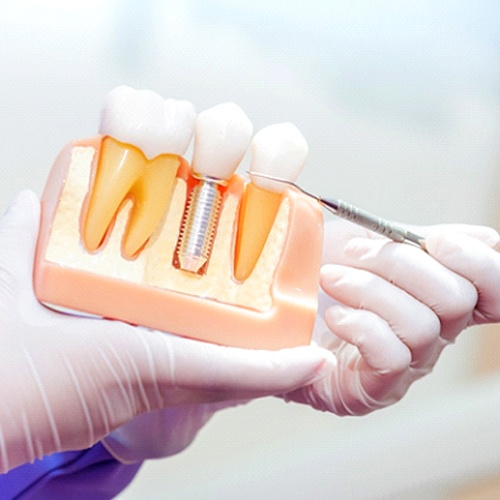

Many people who have suffered the loss of one or more teeth are interested in dental implants. However, they might have been told they are not candidates for the procedure due to some bone deterioration in their jaw. A bone graft can usually address that issue, but for some patients, a different solution is available: mini dental implants. As their name implies, mini implants in Naples are smaller than their traditional counterparts. Therefore, they require less bone mass. Continue reading below to learn more about this potentially life-changing treatment.

Traditional and mini dental implants serve the same purpose and have a similar shape. They are both able to serve as sturdy, long-lasting prosthetic tooth roots. They are also roughly the same length. However, their diameters are quite different. A traditional dental implant is typically 3.4 – 5.8mm wide, while a mini implant is 1.8 – 3.3mm wide. The smallest mini implants are just a smidge wider than a standard toothpick.

Traditional and mini dental implants offer some of the same benefits. For example, they provide long-lasting tooth replacement, support jawbone health, and offer a natural feel and function. Their restorations are virtually indistinguishable from real teeth.
However, mini dental implants have a few advantages over traditional ones:

The best way to find out if many dental implants are right for you is to talk with an expert who offers them. After Dr. Hoop carefully examines your mouth and orders some X-Rays, he will design your custom tooth replacement plan. Mini implants may be right for you if:
Of course, regular dental implants are the better option in some cases. They may provide a stronger bite force and be better for the jawbone’s long-term health.

Both mini and traditional dental implants present a significant upfront cost. In general, though, the cost of mini dental implants is a bit lower. There are a few reasons for this, including the fact that mini implants usually require just one surgery. It is also standard practice to place them with only local anesthesia, rather than anesthesia and sedation.
When you visit us for your consultation, we will provide you with a candid estimate for the cost of your treatment and help you understand your payment options. Your insurance benefits or a dental discount plan, along with financing, may make it surprisingly easy to afford your new smile!

If you have questions about mini dental implants, Dr. Hoop and our team are ready to speak with you. In the meantime, though, you may want to do some more reading about this treatment on your own. Below, you will find answers to some common FAQs about it. We hope that what you discover will give you the confidence you need to schedule your tooth replacement consultation with our talented, compassionate team.
Mini dental implants are suitable for many patients. They can be used similarly to traditional implants—for example, they can replace single teeth—however, they are more often used to support and stabilize dentures. Frequently, they may be paired with a removable overdenture that snaps onto and off of small attachments on top of the implants.
Regular and mini dental implants tend to be the same length. However, mini implants have a smaller width. In fact, while a regular dental implant may be 3.4 – 5.8 millimeters wide, a mini implant may be just 1.8 – 3.3 millimeters wide. Therefore, mini implants are more suitable for use in patients with a narrow jawbone. They also cause less damage to the existing bone structure when they are inserted.
Another difference between regular and mini implants is that regular implants have a two-piece construction, whereas mini implants come in a single piece.
Mini dental implants are very durable. They are made out of a strong titanium alloy that can stand up to all the rigors of everyday eating and speaking. It is extremely unlikely that one of your mini dental implants will break or bend.
Dental implants, including mini dental implants, have the potential to last a lifetime. Of course, whether or not they live up to that potential depends on a few factors, including how well you care for your mouth. Our team will coach you on the steps you can take to protect your restored smile for the long haul. For example, we will advise you to stick to a thorough oral hygiene routine, avoid smoking, and attend regular dental checkups.
Conventional dentures tend to slip and slide in the mouth, especially if they do not fit as well as they should. If you are struggling with such issues, mini dental implants may be able to help. Just a few of these prosthetic tooth roots, placed strategically into your jawbone, can help to keep your teeth right where they belong, thereby increasing your bite strength and eliminating embarrassing slips. In some cases, it is possible to retrofit an existing denture to work with mini dental implants. In other cases, it is necessary to create a whole new set of prosthetic teeth.